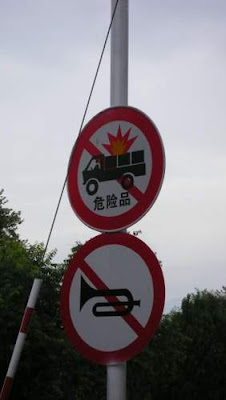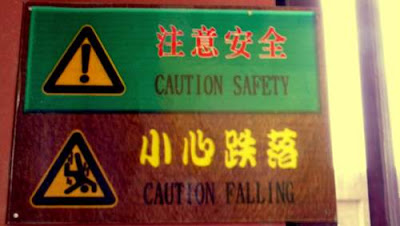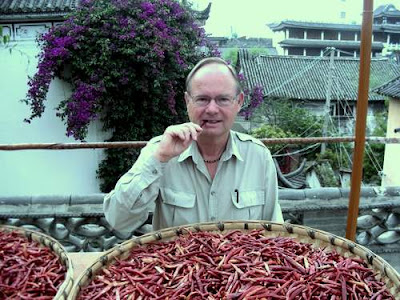 Dear Gentle Reader,
Dear Gentle Reader,
What does this sign mean?
Was it an order?
A suggestion?
A warning?
I have no idea.
Caution... teleological enlightenment ahead?
White hole approaching?
Oncoming anti-tunnel?
Highly reflective surface coming up?
This way to Nirvana?
Beware the big chunk of concrete on the road?
I have no idea.
But, it threw my imagination into rambunctious overdrive.
The next two photos, both from the same sign post, were much easier for your humble scribe to decipher.
The first series reads, from left to right...
1. Pedestrians are permitted to cross here, but they should be careful (they give drivers a target to aim for and, simultaneously, a reason for drivers to stay awake and focused when driving).
2. Horse-drawn carriages (possibly hearses for the pedestrians) are allowed on this street.
3. The third sign allows both heavily-laden trucks and tractors to use this road.
Presumably, the third sign on the post, because of its vertical juxtaposition of two massive vehicles, also indicates permission for the citizenry to hold monster truck rallies on this street (vehicular altercations where one vehicle attempts to crush and drive over other vehicles for non-North American readers).
Three rules were evident, here. Maybe four.
And, everyone seemed to follow them, but this proves very little about order in China.
After all, people, if given permission to do something, may do that thing. However, not doing something that you have been given permission to do is proof of neither order or disorder.
That said, many pedestrians seemed a bit shy about using the crosswalk, or even attempting to cross the street...
The second series of signs, on the same pole, was more useful from an order/disorder perspective.
The second series of signs reads, from top to bottom...
1. Exploding trucks are not permitted on this street.
2. You may not use your horn.
It is true that we saw no exploding trucks on this street.
If that is proof of order, then so be it.
We did, however, see a truck filled with dozens of rusty propane tanks, the squat barbecue types, stacked four or five levels high in the back of a truck...
We also heard horns, which was useful, as we were (foolishly) trying to use the crosswalk...
Some rules are, apparently, more honoured in their breach than in their observance.
And enforcement appeared to be non-existent, even though police were around.
(It's China. Police are always around.)
Over two thousand years ago, during China's second imperial dynasty, the Han Dynasty (206B.C.-220A.D.), there was a Chinese Emperor named Wu the Martial (漢武帝).
Wu the Martial reigned from 141 B.C. to 87 B.C.
Emperor Wu the Martial is well remembered in China for both the physical growth of the Han Empire, what we now think of as China, under his leadership, and for his skill at governance and administration.
Emperor Wu also had great bureaucrats and policy analysts; Mandarins, if you will, to help him govern well. They determined what laws would be effective, and then the armies, omnipresent police (this is China), and magistrates both imposed and maintained laws and order to govern wisely and well.
But, sometimes, needs change.
Within three years of Wu the Martial's death the situation in the Han Empire had changed significantly. The civil service continued to draft laws, but they were not always enforced, or enforced evenly.
In 84 B.C., state policy regarding state monopolies over iron and salt was discussed and written down by Huan Kuan (桓寬), one of Emperor Wu the Martial's Mandarins, in "Discussions about Salt and Iron" (Yuantielun, or 鹽鐵論).
Huan Kuan observed that society never suffers from a scarcity of laws, but, rather, it suffers from a lack of political will to enforce those laws which it does possess.
I completely agree with Huan Kuan.
Huan Kuan further suggested that it was fatal to a nation to pass laws and then to not implement those laws.
I agree, again.
China, today, has more laws and orders than it has ever had in my memory as a businessman, international mediator and arbitrator, lawyer, traveller, and observer.
But, I am not sure how the law and order front is doing.
It certainly cannot be easy for truck drivers, horse drivers, pedestrians, and, especially, drivers whose trucks are about to explode, to determine where certain actions can and cannot occur.
[Even if it is reasonable to regulate exploding truck areas and non-exploding truck areas which I am not conceding, at this point in time.]
When a reasonably intelligent traveller standing at the side of the road, scratching his head, with all the time in the day at his disposal, cannot figure out what some of the signs, visual indicators of laws, might mean, how can a poorly-paid, underfed, overworked, minimally educated worker be expected to perform better? Especially while that worker is driving a truck or a tractor or a horse or an explosion waiting to happen?
Further, the situation worsens when one considers that, despite the growing repleteness and completeness of the available laws in China, few are ever enforced. Unless someone has an axe to grind with you. Or the state apparatus, or an apparatchik, want something of yours...
Laws and orders do not equate to law and order.
With that, and with no other conclusion, I sign off for today.
Tschuess,
Chris
P.S. I'm in China, again, for a few days, so I will not be able to respond to any comments until next week.
 Dear Gentle Reader,
Dear Gentle Reader,























